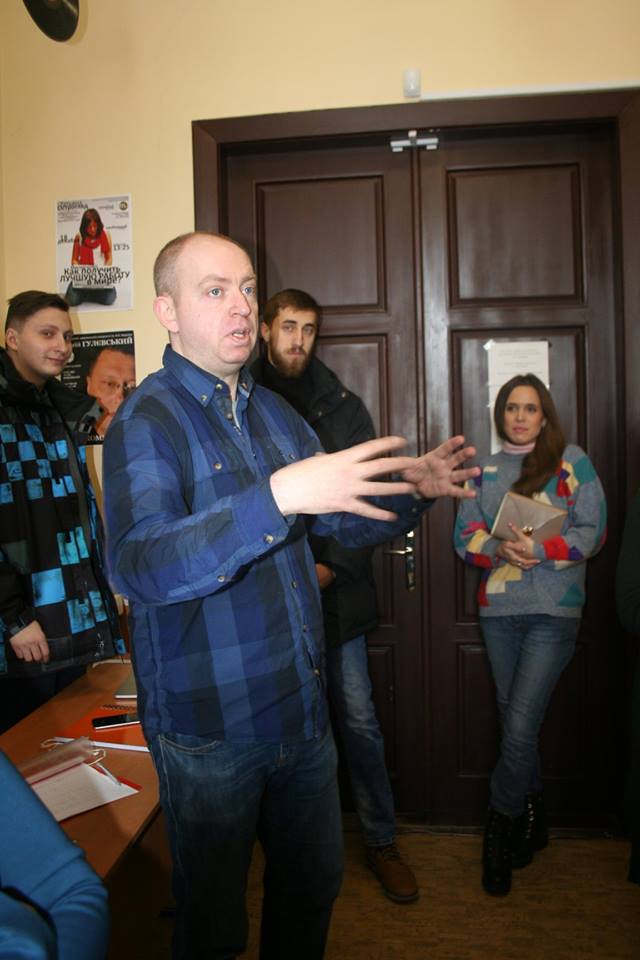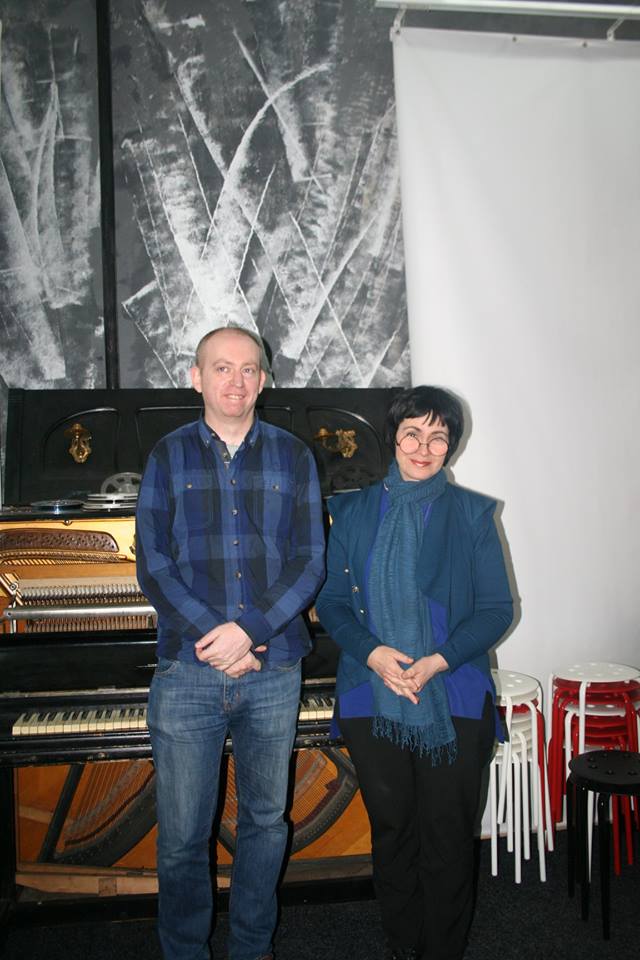Amber MacIntrye presented brief findings of her ongoing PhD research at the annual ECF Campaigning Forum in Oxford on 10-11 April 2018. Amber is currently conducting fieldwork in Berlin as she examines how advocacy and campaigning groups use data. Find Amber on Twitter @Sliktor
NPC Wired Episode 5: Viral Memes as a Tool of Political Protest in Russia
This week's episode, hosted by Sofia Collignon Delmar and Nikki Soo, features Anastasia Denisova. Discussing the use of viral memes as a form of political protest and resistance, she explains how this is particularly important with censorship in Russia. She also shares more on her data collection methods, challenges she faced along the way, and her favourite meme.
Dr Anastasia Denisova is Lecturer of Journalism at the University of Westminster. Before embarking on academia, she spent a decade as a journalist in Russia. She is currently writing her book Internet Memes and Society based on her research on Internet memes as the casual artful means of political resistance in the restricted Russian media environment. It will be available in 2019. Read more about her research here, and follow her on Twitter here.
NPCU event on EU diplomacy and narratives, Chatham House, 17 April 2018
Chatham House will host a private discussion of findings from the C3EU project - Crisis, Conflict and Critical Diplomacy of the EU - on 17 April 2018. Ben O'Loughlin and colleagues Natalia Chaban and Patrick Müller will present analysis on productive ways for the EU to communicate with and engage audiences in Ukraine and Israel-Palestine.
Crisis, Conflict and Critical Diplomacy: Narratives and Perceptions of the EU in Ukraine, Israel and Palestine
Tuesday, 17 April | 14.00 - 15.30
Speakers:
Natalia Chaban, Professor of European Union Studies, University of Canterbury, New Zealand
Ben O'Loughlin, Professor of International Relations, Royal Holloway University of London
Patrick Müller, Ikerbasque Research Fellow, University of the Basque Country, Spain
Chair:
Yossi Mekelberg, Associate Fellow, Middle East and North Africa Programme, Chatham House
Location:
Chatham House | 10 St James's Square | London | SW1Y 4LE
This roundtable will explore findings from a Jean Monnet-funded 3-year study of strategic narratives and perceptions of the EU in two conflict spaces, Ukraine and Israel-Palestine. By identifying how different local actors (elites, media and youth) narrate the international system and the role of their nation in it, is it possible to explain how and why they offer specific narratives about future prospects for peace and the EU’s role as potential mediator?
The roundtable will be held under the Chatham House Rule.
Communicating Britain's role in the world - O'Loughlin Parliamentary evidence posted
Written evidence by Ben O'Loughlin and Alister Miskimmon has been published by the House of Lords International Relations Committee. The authors respond to the Committee's call for recommendations about what Britain's role should be in international affairs and how this can be communicated. Their evidence draws on findings from their research on strategic narratives and public diplomacy, but has wider application for how states communicate in a world where identities and perceptions are difficult to manage. Read their evidence here, and find out more about the committee here.
A Guide To Observing Everyday MP-Constituent Interactions
(Typing up field notes between surgery meetings. Sussex, 2016)
Members of Parliament (MPS) are often viewed negatively in opinion polls and the constituency work they carry out is not often talked about. Over the course of my doctoral research I sought to find out what MPs actually do by closely observing intimate details that made up contemporary interactions and communication between MPs and their constituents. To collect the data required, I carried out an ethnography of MPs in their constituencies over 15 months. This experience proved to be rather challenging, but also the most rewarding component of my PhD. For the purpose of this post, I will focus on briefly discussing the process of selecting this method and challenges I encountered when embarking on my fieldwork.
Guided by the analytically rich ethnographic work of Fenno (1978) and Nielsen (2012), I selected ethnography as one of my methodologies (the other two being semi-structured interviews and discourse analysis). It allowed me intimate access to complex episodic interactions between MPs and their constituents. I primarily focused on the MP-constituent interaction during the advice surgery, which I sat in on as an observer, as long as the constituent was comfortable with me doing so. For the uninitiated, an advice surgery is a one-to-one meeting MPs hold with constituents, where they are able to seek their MPs help or ask for their advice. These are regularly held, and often hosted in a public area in the constituency such as a public library. I also followed MPs as they presented speeches in town halls, attended local council meetings and went on walkabouts in the constituency. Part of my ethnographic work also involved collecting data from MP communications that were produced and disseminated while in the constituency, both in person and what was posted online.
Ethnography involves the full-time involvement of the participant-observer (in this case, myself) over a period of considerable length and demands the interaction with the study of chosen human subjects in their natural environment (Van Maanen, 1988: 1–2). The advantage (and on occasion, drawback) of a method like ethnography is not knowing what you are looking for until you are knee deep in it.
I carried out a pilot study before committing to ethnography as one of my methods. A pilot study, also known as a feasibility study, is a mini version of a full-scale investigation (Teijlingen and Hundley, 2001). Aligned with a reflexive approach to qualitative research, it provides valuable insights and allows adjustments to be made to the research design. I reached out to a Conservative MP who represented a constituency in southeast England. With his consent I shadowed him and his caseworker as they carried out advice surgeries on a Friday afternoon in November 2014. The pilot study confirmed that there were unique details about the face-to-face interaction worth pursuing, including the management of upset or angry constituents. I also uncovered details I missed out or had not thought of during the planning of my fieldwork, such as attempts to influence constituent behaviour with posts on his social media accounts. I fully recommend a pilot study to anyone uncertain about utilising a method as demanding as an ethnography.
Getting In
Having decided to undertake the ethnography, I needed a way in. Gaining access to the group you intend to observe can be tricky, especially a group of busy parliamentarians. I started the project by approaching MPs from three major British political parties for the opportunity to shadow them in their constituency. I sent letters introducing myself, briefly explaining my project aims and invited them to participate.
To this end, here are three things I have learned:
1. Strength of networks
The success of relying on your existing networks of friends and contacts might vary but it never hurts to ask. Often a former classmate might know someone who knows someone who knows someone else… You get the idea. Approximately half of the MPs who agreed to participate in my research (by way of the ethnography and/or granting me an interview) were introduced to me by contacts that had previously worked with them in some capacity or another.
2. Perseverance is key
Short of sounding like a motivational coach, try, try, and try again. To achieve the breadth and depth my research required to be considered rigorously sound, I sent emails to 100 MPs. Some replied and many did not. Do follow up on unanswered emails, or try a polite phone call to check if they received your email. More so than anyone else, MPs are busy individuals and emails do get lost or forgotten. Those who did reply and eventually agreed to let me shadow them often proved to be helpful in more than one way (see below).
3. Maintain good relations with participants
Making an effort to establishing and maintaining relationships with participants demonstrates respect for their time. After all, they have allowed you to trail behind them, observing their every move. This not only includes the MP, but also their staff, as they are the ones who I often interacted with to arrange and confirm each shadowing. I also found that establishing friendly relations with my participants allowed me to snowball my sample. This was often achieved by conversing between meetings. One MP in particular, not only recommended me MPs to approach, but made a call to a fellow Labour MP to arrange a meeting for me that very day.
Ethical Considerations
Any ethical issues or complications that might arise had to be thoroughly considered prior to carrying out the actual fieldwork had. With the sensitivity of surgery interactions and personal issues discussed, I placed importance on assuring participants (MPs, their staff, and constituents) that their identities and anything discussed would remain confidential.
With approval from the departmental research committee, I developed clear and concise consent forms to ensure my participants were aware of what my project was about, the voluntary nature of their participation and allowing me the use of anonymised quotes. These were accompanied by a letter briefly describing my research objectives and sent to all MPs who agreed to be shadowed. This not only created a sense of rapport and trust between myself as the researcher and the MPs, but also with the MP’s caseworkers. In addition, I signed confidentiality statements provided by the representative’s offices, ensuring that nothing incriminating and sensitive would result in the identification of the constituent or the MP (should they choose to be anonymous).
I was also careful to ensure constituents were informed about my research and presence at the start of every interaction. In the event any of them were uncomfortable, I would offer to leave the room. Over the course of fieldwork, all except one of the constituents were comfortable with my presence. When it came to finally writing up my findings, apart from MPs comfortable to be named, all other names (included staffers and constituents) were altered. To further protect the anonymity of the people involved, specific details of locations are intentionally obscured.
Maintaining Boundaries
As the observer becomes accustomed to the community or group of people they are studying, they often run the risk of lines between observer and participant blurring. A concern with ethnographic work, this may result in the researcher’s objectivity being compromised. To ensure boundaries were preserved, I sat close to MPs and their caseworkers during meetings, but did not participate apart from introducing myself at the start of every meeting.
Fears of participants behaving unnaturally with me were allayed the more time I spent with them. I observed them repeatedly carrying out their constituency duties in similar fashions, reducing the possibility of an act. They also became accustomed to my presence, and often focused on the many responsibilities they to attend to. In addition, I carried a small notebook around with me, recording my field notes in as much detail as possible between meetings and individual interactions, rather than during the meetings. This was deliberately done so that constituents, MPs and caseworkers would feel comfortable and natural during meetings.
Despite the difficulties in getting started and amount of effort required, the ethnographic approach was fulfilling. It allowed details about an MP’s constituency life to emerge organically. I also had the opportunity to explore various picturesque parts of England while doing so (see image above)! Along the way, I learned about the challenges faced as they integrated digital tools across their parliamentary and constituency work; the importance of making time for their family; and perhaps most importantly, that they genuinely cared about what they did.
Dr Nikki Soo earned her PhD from the New Political Communication Unit at Royal Holloway’s Department of Politics and International Relations. Find out more about her work here or follow her on Twitter @sniksw.
O'Loughlin to speak at 'Contentious Narratives' event in Washington DC
George Washington University
Ben O'Loughlin has been invited to address a high profile conference in Washington DC next month on the theme of disinformation and the Ukraine crisis. The conference, Contentious Narratives: Digital Technologies and the Attack on Liberal Democratic Norms, is organised by Steven Livingston from Harvard University and takes place at George Washington University in downtown DC on 2-3 April 2018. It brings together three dimensions: 1) Strategic narrative theory, as developed by Miskimmon, O'Loughlin and Roselle; 2) Computational propaganda (speakers include Kate Starbird and Sam Woolley); and 3) The illiberal turn in global politics (speakers include Katharine Sikkink and John Shattuck). Is computational propaganda being used to promote illiberal strategic narratives that undermine the current world order, or is the picture more mixed?
NPCU is grateful to Steven for putting strategic narrative theory front and centre in the debate about the present and future world order.
NPC Wired Episode 4: On Playing Games of Persuasion with Big Data and Micro-targeting
This week's episode, hosted by Professor Ben O'Loughlin and Dr Elinor Carmi, features Dr Jennifer Pybus. She discusses an array of important subjects, from Trump's use of data in his Facebook campaign (read more about that here), the covert shift to consumerist purchasing funnel in politics resulting in a large degree of personalisation, to China's social credit system.
Dr Jennifer Pybus is Lecturer in Digital Culture and Society at King's College London. Her current research looks at the politics of datafication and everyday life, specifically in relation to those critical points of tension that lie at the intersections between digital culture, Big Data and emerging advertising and marketing practices. Read more about her research here, and follow her on Twitter here.
O'Loughlin visits V.N. Karazin Kharkiv National University
Ben O'Loughlin has been visiting V.N. Karazin Kharkiv National University in Ukraine this week, one of the partner universities in our Jean Monnet project on EU Diplomacy in Conflict Regions. Ben met film-maker and TV host Lidia Starodubtseva, Head of the School of Media and Communication. He talked to her students about why Ukraine is of interest to researchers in Western Europe, how they as young people can further the democratisation of Ukraine, and addressed their concerns about whether Islamic State pose a threat to cities in Ukraine. Today he will present to the School of Foreign Languages on the topic, 'Forging the World: Strategic Narratives and the Power of Language'.
NPC Wired Episode 3: Discussing Ethics, Technology and Data
This episode of NPC Wired features two doctoral researchers from the New Political Communication Unit, Amber Macintyre and Declan McDowell-Naylor. Their timely research and discussion considers the use of ethnography in their research, data privacy, and autonomous vehicles.
Amber is an NPC PhD candidate at Royal Holloway. Her research examines the use of personal data in political organisations, exploring the tension between the benefits for campaigning and the ethical concerns. The project is inspired by her previous work as Digital Activism Officer at Amnesty International which involved training activists how to be safe online while using the same technologies to campaign effectively. Follow her on Twitter @Silktor.
Declan is a doctoral researcher in the New Political Unit at the Department of Politics and International Relations, Royal Holloway University of London. He is also a visiting tutor, teaching on both political theory and British democracy. He is currently writing up his PhD thesis on autonomous vehicle development in the United Kingdom, with an emphasis on the role of public participation. Declan has previously worked as a research assistant on different research projects with the New Political Communication Unit. His Twitter handle is @declan_djmn1. Follow his work on his website here.
New British Council report on cultural relations by O'Loughlin and colleagues
Ben O'Loughlin and colleagues have published a new report for the British Council comparing how Germany and the UK approach cultural relations. The report stems from comparative research looking at how the British Council and Goethe Institute use cultural relations in Ukraine and Egypt to create social change. The new report provides the historical reasons why each country differs in their approach - how Germany and the UK each engage with the world is part of a much longer set of political histories. This report contextualises the ongoing research project, 'The Cultural Value Project: Cultural Relations in Societies in Transition', funded by the British Council and Goethe Institute. In the next year, the team will publish findings about how cultural programmes lead to different forms of social change in hot political climates. It also reveals the unexpected consequences and tensions that emerge when a society decides whose culture it values.
Read a summary of the report and download the PDF here. Thanks to co-authors Marie Gillespie, Eva Nieto McAvoy and Malte Berneaud-Kötz.










